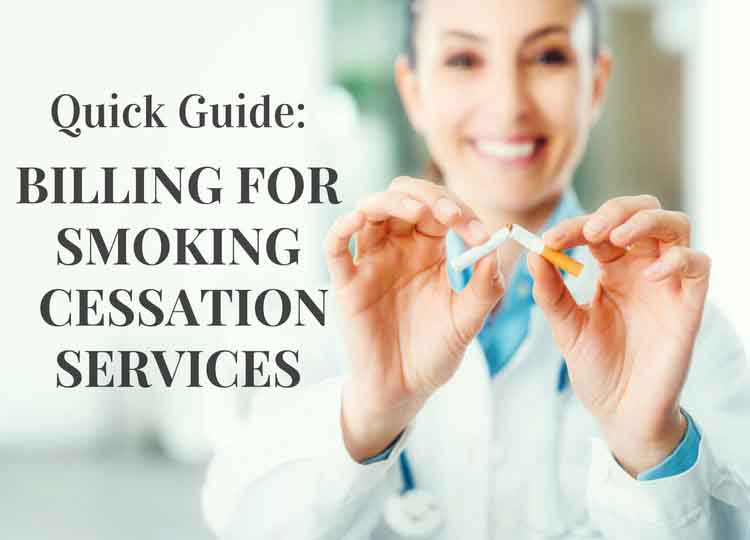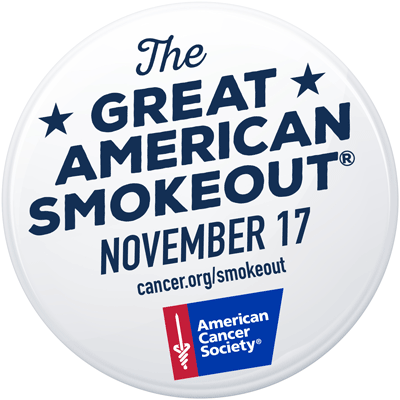
The American Cancer Society’s Great American Smoke Out is a nationwide day, the third Thursday in November, dedicated to helping smokers stop smoking. So far, it has worked! There are now more former smokers in the Nation than current smokers.
When trying to quit smoking, support can make all the difference! If your medical practice is already providing smoking cessation counseling and treatment, did you know you can bill and get reimbursed for your services?
 Stats About Smoking
Stats About Smoking
In 2010, 7 out of 10 smokers who desired to quit were successful! It is possible to quit smoking with proper help from your doctor. When smoking is stopped, for even one day, the human body reaps the benefits of overall better health and the decreased risk of cancer.
Helping Patients Stop Smoking
The American Cancer Society says that there are scientifically proven ways to stop smoking, and many medical practices may already be using them.
Effective treatments, according to the American Cancer Society include:
- Seeing the doctor for advice on quitting
- Counseling from a physician, group, or telephone
- Prescription medications and nicotine patches
- Former smokers report that nicotine gum or candies can help fight the urge, too.
One treatment may not work alone. Many people need a combination to quit once and for all.
Can You Bill For Smoking Cessation Services?
In 2014, smoking cessation became a covered benefit under the Affordable Care Act (Obamacare). This means that Medicare and commercial insurance carriers must provide smoking cessation counseling and interventions. These services include:
- Tobacco use screening for all adults and adolescents
- Tobacco cessation counseling for adults and adolescents who use tobacco, and expanded counseling for pregnant women
Who Is Covered?
For a Medicare patient to qualify for smoking cessation counseling they must meet the following requirements:
- Use tobacco, regardless of whether they exhibit signs or symptoms of tobacco-related disease
- Patient must be competent and alert at the time of counseling.
- Counseling must be provided by a qualified physician or other Medicare-recognized healthcare provider.
Smoking Cessation Counseling Codes 99406 and 99407
Reimbursement may be possible if you bill the patient’s insurance company correctly. Medicare covers 2 cessation attempts per 12-month period. Each attempt includes a maximum of up to 4 intermediate (99406) or intensive (99407) counseling sessions, with a total Medicare benefit of 8 sessions per year.
The CPT codes are listed below for billing for smoking cessation:
99406 – Smoking and tobacco use cessation counseling visit; intermediate, greater than 3 minutes up to 10 minutes
99407 – Smoking and tobacco use cessation counseling visit; intensive, greater than 10 minutes
A modifier 25 may be appropriate to append to the primary E/M visit code.
Note that as of September 30, 2016 HCPCS codes G0436 and G0437 for smoking cessation have been deleted.
Some commonly used ICD-10 diagnosis codes used, if appropriate given your patient’s situation, may include:
F17.200 Nicotine dependence, unspecified, uncomplicated
F17.201 Nicotine dependence, unspecified, in remission
F17.210 Nicotine dependence, cigarettes, uncomplicated
F17.211 Nicotine dependence, cigarettes, in remission
F17.220 Nicotine dependence, chewing tobacco, uncomplicated
F17.221 Nicotine dependence, chewing tobacco, in remission
F17.290 Nicotine dependence, other tobacco product, uncomplicated
F17.291 Nicotine dependence, other tobacco product, in remission
Z87.891 Personal history of nicotine dependence
Though the billing codes are relatively simple, there are rules to follow when billing Medicare based on the patient’s symptoms.
The Medicare Learning Network from CMS provides information that may be helpful.
Check with your local Medicare carrier or private insurance company for their rules and requirements before billing for smoking cessation.
Documentation Requirements
The documentation in the medical record must support the billing of the cessation code. The documentation needs to record what was discussed during counseling and should show a significant and separately identifiable service.
Items to document may include to following elements:
- The patient’s tobacco use
- Advised to quit and impact of smoking
- Assessed willingness to attempt to quit
- Providing methods and skills for cessation
- Medication management of smoking session drugs
- Resources provided
- Setting quit date
- Follow-up arranged
- Amount of time spent counseling patient
An entry in the patient’s health record simply stating that the doctor spent 11 minutes counseling the patient on tobacco use will not cut it and will not meet the standard for medical necessity or to be able to bill the codes.
Reimbursement for Smoking Cessation
Are you losing money by not coding and billing for smoking cessation? If you are already counseling for smoking cessation in your practice, you are doing the work, so get paid for it.
Medicare reimbursement for 99407, smoking cessation for longer than 10 minutes of counseling is $ 27.93.
The 10 minute or longer consult may not apply to everyone. The 3 to 10 minute counseling code, 99406, reimburses $ 14.32. These are national reimbursement amounts, your local Medicare payments may vary.
99406 = $ 27.93
99407 = $ 14.32
For Medicare co-insurance and deductibles are waived.
Where Can Smokers Get Additional Help?
A couple of resources your doctor can provide to their patients are: The American Lung Association hosts the Freedom From Smoking group that helps coach the smoker to quit. They offer free support and tools to get the person to stop smoking.
The CDC mentions calling 1-800-QUIT-NOW (1-800-784-8669). This can help if the patient is not computer savvy, but wants help. They will also give free support and advice, developing a plan that’s right for the patient.
Steps to helping our patients become smoke-free are reimbursed by many insurance companies. Beyond getting paid for the counseling, patients will give you credit for helping them start their journey to a smoke-free, healthier life.
Quitting isn’t easy, so make sure your patients know how much you support them every step of the way!
Is your practice billing for smoking cessation? Let me know in the comments.

— This post Quick Guide: Billing for Smoking Cessation Counseling 99406 and 99407 was written by Manny Oliverez and first appeared on Capture Billing. Capture Billing is a medical billing company helping medical practices get their insurance claims paid faster, easier and with less stress allowing doctors to focus on their patients.
Capture Billing








